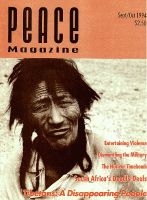
Peace Magazine Sep-Oct 1994, page 4. Some rights reserved.
Search for other articles by PMag staff here
One of the most significant debates going on today centres around these questions how much (if any) influence does violence in the entertainment media have in stimulating more violence, especially among young people? Peter Nicholls, approaching the question as a biologist, does not believe that it is a significant cause of the total amount of violent crime in North America. Others strongly disagree with his views- and often can produce evidence to the contrary. Valerie Smith, for one, is actively pursuing the goal of reducing displays of violence on television. She went after CITY-TV for airing a special show on O.J. Simpson several weeks after the original news story broke-and she has found a new wrinkle that seems to work well. Nancy Toran Harbin is moving against a different source of evil: mass murder trading cards for small children. Read these stories and let us know what you think.
Also, the Canadian government is reviewing its defence policy these days, and a committee is traveling around the country listening to the views of citizens. Science for Peace prepared an especially bold and interesting document, which is presented here in an abridged form. According to this proposal, Canada would phase Out its military and institute instead a number of other services that would protect other aspects of citizens' security. It would also make greater use of civilians in peacekeeping operations. We'd like to hear your views of this too.
By the way, our letters page is a crucial part of our mission. We occasionally publish articles with which most or all of us disagree. We count on your letters as a means of advancing the public discussion of the issue. So if you don't like an article, do sound off!
Linus Pauling died in August at the age of 93. Most Canadians of our day probably remember him best for promoting the use of vitamin C originally for the common cold, and then for cancer, AIDS, and other ailments. In history he will be remembered more for his work in chemistry (he won a Nobel prize in 1954 for his work on molecular bonds) and disarmament (he won a second Nobel prize in 1964 for peace). He has been given some of the credit for the Partial Test Ban Treaty of 1963. During the years of McCarthyism, Pauling's activism made him unpopular in the U.S. and he lost his passport for two years, receiving it back only when he needed to go to receive a Nobel prize.

Peace Magazine Sep-Oct 1994, page 4. Some rights reserved.
Search for other articles by PMag staff here